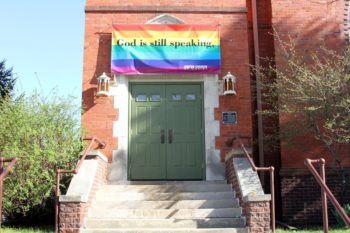
The doors of The Ames United Church of Christ, photo courtesy their website.
An Ames church became the victim of criticism after throwing a LGBT+ friendly Halloween party in October.
The Ames United Church of Christ’s party was called “Drag-O-Ween.” Pizza was provided and activities included crowning a king and queen as well as a gender neutral ruler.
A vlogger called Activist Mommy found out about the party and wrote a piece criticizing the church’s open and affirming stance regarding LGBT+ people, calling the party an opportunity to “recruit children into the lifestyle.”
The blog went on to ask readers to contact the church and criticize them directly, providing a link to the church’s Facebook page and phone number. This is what led to the cyberbullying.
Senior Minister Eileen Gebbe says that the negative reaction did not cause the Ames UCC to reconsider its position. She says that a few people (though no congregation members) asked whether she might want to take down the pro-Muslim sign, or remove the various rainbow flags from the front of the church.
“Without hesitation no, because if we do, then everything we say is a lie,” Gebbe said. “There’s no fear in the congregation. And the response from the community after all that was so strong, people are aware of what we’re doing and are grateful for it, so we can’t back down.”
The United Church of Christ is organized a little differently than many churches are. Instead of having a top-down structure where a ruling organization at the top dictates how individual churches behave, “5,000 churches agree to be in cowvenantal relationship with no one telling us what to do. So under 40 percent of churches in the UCC are what we call Open and Affirming,” Gebbe said.
This means that not all churches belonging to the UCC are as welcoming as the Ames church is. Each individual church decides for themselves.
As far as Gebbe’s church is concerned, all are welcome. And this welcome extends past just the LGBT+ community. According to her, about one-third of the congregation consider themselves to be agnostic or atheistic, and there is no point where they would need to change their minds to continue to participate. She believes that this gives the church permission to disagree, to consider where each individual is coming from, “and to respect where other faithful people still are.”
“Part of our polity is that we will stay together even when we disagree, because there is some accountability to discipleship and community from not being just a one-sided organization,” she said. “We learn from everybody.”





Comments